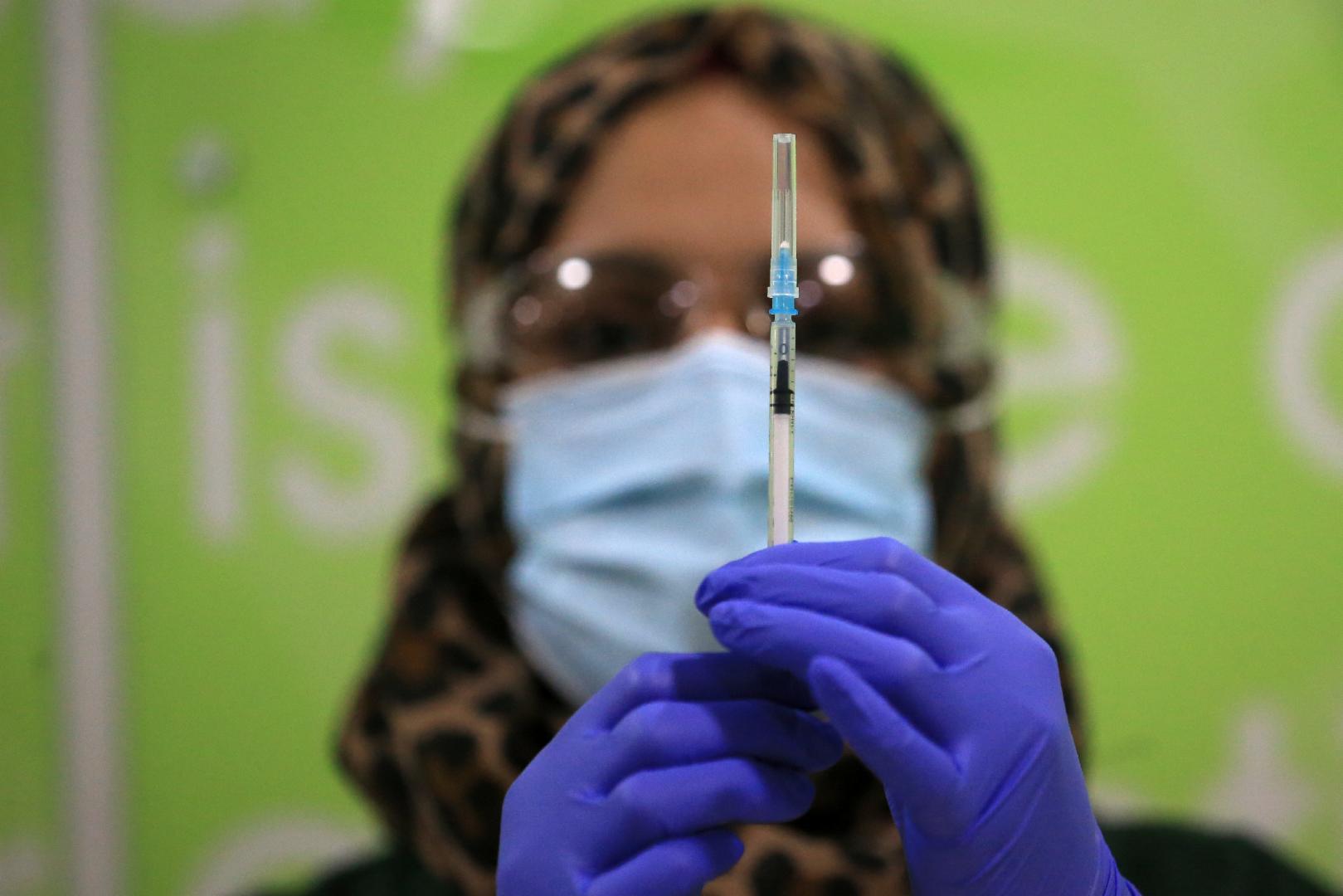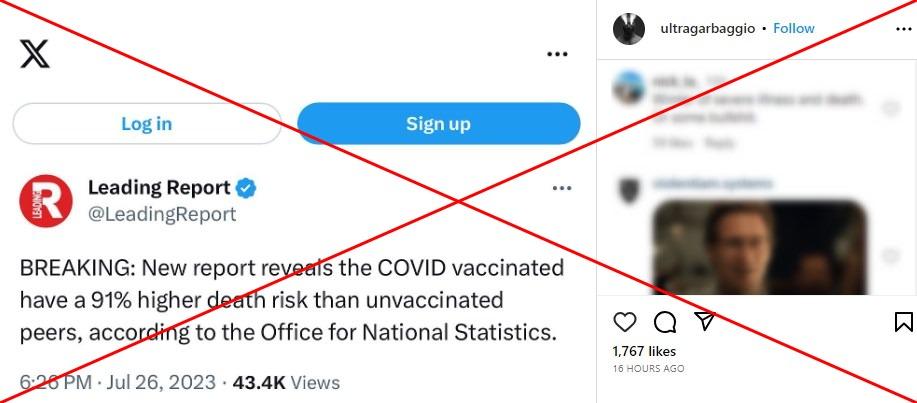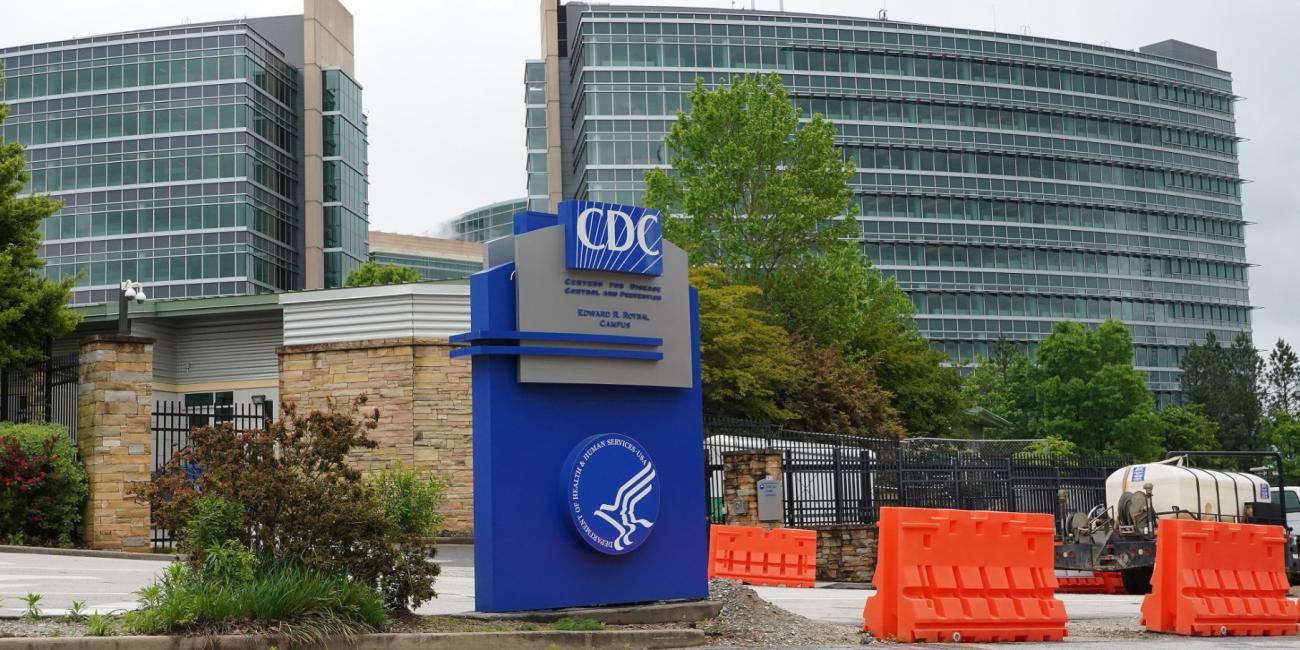
Posts distort UK data on Covid vaccines, death
- This article is more than two years old.
- Published on July 31, 2023 at 22:47
- 4 min read
- By Daniel FUNKE, AFP USA
"BREAKING: New report reveals the COVID vaccinated have a 91% higher death risk than unvaccinated peers, according to the Office for National Statistics," says a July 26, 2023 post from Leading Report on Twitter, the social network being rebranded as "X."
The supposed breaking news account, which AFP has repeatedly fact-checked for spreading misinformation, racked up thousands of likes and shares on its post. Similar claims circulated elsewhere on the platform, as well as on Instagram.

The posts are the latest in a series of allegations that Covid-19 vaccines -- credited with saving millions of lives around the world -- are unusually dangerous. The claims run counter to public health guidance in the United Kingdom, where officials have long said the shots are safe and effective at preventing severe illness and death (archived here).
As evidence, the posts cite a chart with supposed data from the country's Office for National Statistics (ONS). The graphic appears to show that, between 2021 and 2022, the average mortality rate among people aged 18-39 was significantly higher for those who had received two vaccine doses compared to their unvaccinated peers.
"The official figures presented by the UK's Office for National Statistics strongly suggest that Covid-19 vaccinations kill and increase a person's risk of death due to any cause," says Patrick Webb, a writer for Leading Report, in a July 26 post.
But the data suggest no such thing, according to ONS.
"People die all the time, of all causes, regardless of vaccination status -- and correlation is not the same as causation," said Lorna Tipper, a media relations officer for the office, in a July 28 email.
What the data show
Claims that vaccinated UK citizens have a more than 90 percent higher risk of death than their unvaccinated counterparts have circulated online since at least 2022. AFP has previously debunked similar misinformation.
The posts refer to an ONS table with a breakdown of deaths by vaccination status. The data (archived here) show that, on average, unvaccinated 18- to 39-year-olds did make up a smaller proportion of all deaths between January 2021 and 2022 than those who had received any number of Covid-19 vaccine doses.
But that does not mean the shots cause death. By the end of January 2022, more than 91 percent of UK citizens aged 12 and older had received at least one dose of the Covid-19 vaccine, according to historical data from the UK Health Security Agency.
"When most of the population is vaccinated, most deaths are in vaccinated people," Tipper said.
She added that unvaccinated people "are likely to be younger, which reduces the deaths in the unvaccinated compared to vaccinated category." That is because older people are more at risk of serious illness and death due to Covid-19.
"Furthermore, the nature of the UK vaccine rollout meant clinically vulnerable people were given priority," Tipper said. "Mortality rates should therefore be interpreted carefully because of the way those at risk with comorbidities were prioritized."
Shots are safe, effective
Data from the United Kingdom's Covid-19 vaccine rollout indicate the shots are effective at preventing severe illness and death -- and that serious reactions are rare.
The jabs are associated with some rare adverse events, including allergic reactions and heart inflammation, according to the National Health Service (archived here). But conditions such as myocarditis are far more common following Covid-19 infection.
Between March 2020 and June 2023, there were 64 deaths involving "Covid-19 vaccines causing adverse effects in therapeutic use," according to an ONS dataset (archived here). Nevertheless, figures support public health authorities' conclusion that vaccination is safe and effective:
- The same ONS dataset cited in the posts shows that, between January 2021 and 2022, far more unvaccinated people died due to Covid-19 than vaccinated individuals -- despite the fact that the former group comprised a minority of the population for most of the year.
- Data collected between March 2021 to 2022 (archived here) indicate a third Covid-19 vaccine dose was nearly 78 percent effective at preventing hospitalization and about 93 percent effective at preventing death.
- An ONS study published in March 2023 (archived here) analyzed mortality rates following Covid-19 vaccination and found "no increase in risk of death or cardiac death for young people aged 12-29."
The ONS research found some evidence of an increased risk of cardiac death among women after one dose of a non-messenger RNA vaccine. The United Kingdom moved to offer alternatives to the Oxford-AstraZeneca jab for younger people in April 2021.
The World Health Organization says on its website (archived here): "Billions of people have been vaccinated against Covid-19. Getting vaccinated is one of the most important things you can do to protect yourself against Covid-19, help end the pandemic and stop new variants emerging."
AFP has fact-checked other false and misleading claims about vaccines here.
Copyright © AFP 2017-2026. Any commercial use of this content requires a subscription. Click here to find out more.
Is there content that you would like AFP to fact-check? Get in touch.
Contact us




